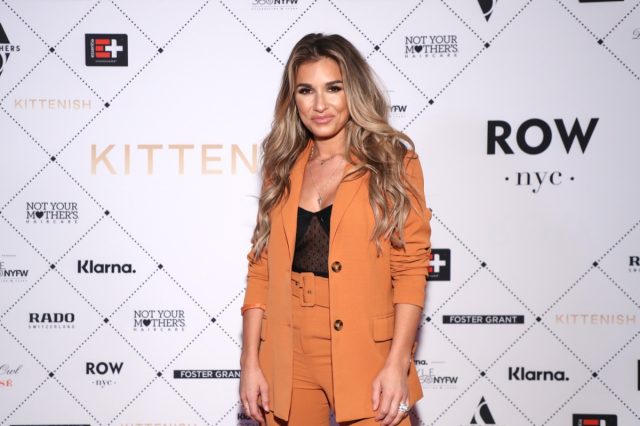Jessie James Decker’s Fat-Burning Food Rules, Say Dietitians

Jessie Decker James is no stranger to showing off her toned physique and we don’t blame her. The mother of three looks amazing! Scroll through her Instagram feed and you’ll see countless stunning photos of the country singer, but you’ll also see images of her working hard for her fit figure. “It takes a lot of hard work and discipline,” she said in a YouTube video about her diet and workout routine and CelebWell talked to experts who break down her regime. Read on to see 5 ways Jessie Decker James stays in shape and the photos that prove they work—and to get beach-ready yourself, don’t miss these essential 30 Best-Ever Celebrity Bathing Suit Photos!
She Counts Calories

“I stay within the 1200-1500 range,” she told fans in a YouTube video about how she got back to her pre-pregnancy weight. Jana Beaudoin, NBC-HWC Certified Health & Nutrition Coach Anti-Aging & Longevity Center of Philadelphia says, counting calories is, “The act of accountability. Recording your food intake increases awareness and intention around what you are eating and how much. The added level of awareness guides your decision making around food. Recording food and counting calories also helps to address the issue of eating out of boredom and stress and adds a component of mindfulness to your daily nutritional choices. You need a calorie deficit to lose weight. Knowing your basal metabolic rate, activity level, your current weight and your desired weight will help you determine how many calories you need each day to achieve your weight loss goals. It is important not to become excessive with your calorie deficit as your body will then be forced to pull energy from protein stores which can cause the breakdown of muscle. Using an app to record food choices and calories provides the added benefit of reviewing your daily intake of fiber, protein, vitamins and minerals. A diet rich in protein and fiber increases satiety helping you to feel full with less calories. A quick nutritional analysis can give you valuable information that may be impeding weight loss efforts. Generally a balanced diet, portion control, exercise, in addition to stress management and sleep hygiene are essential when it comes to weight management.”
Hydration

According to People, the mom of three drinks plenty of water. Robert Dodds, a Certified Personal Trainer, a fitness coach, and founder of nothingbarredfitness.com, a fitness coaching service for busy parents says, “Water intake and hydration levels do not directly influence weight loss. However, a good level of fluid intake can assist with weight loss, providing you have a calorie controlled diet, as it will help you to feel full – especially if water is drunk before and during meals. This is because water takes up space in your stomach and is an appetite suppressant. Sparkling water works especially well as the gas takes up space too. Being well hydrated is important for many factors relating to weight loss, such as muscle function and digestion, but it does not directly drive it. A calorie deficit must always be present. Switching from a drink with calories to drinking water instead may drive weight loss, if this switch leads to a calorie deficit (burning more calories than you take in). Weight loss and health are two separate things that sometimes overlap. Having good habits around hydration and keeping up a good water intake is good for your health, but it won’t drive weight loss on its own. Being well hydrated means your blood is less viscous (thick). This means it’s easier for your heart to pump, and it also can return to your heart more easily. This will help your blood pressure readings to remain healthy. If your blood is less viscous it is easier for it to reach all areas of your body and deliver nutrients. Daily fluid intake for men should be about 15.5 cups (3.7 liters). For women it is about 11.5 cups (2.7 liters). This doesn’t have to be just from water. All fluids count, including tea and coffee.”
South Beach Diet

E! News reports that Decker helps keeps the weight off by doing the South Beach Diet. Dana Ellis Hunnes PhD, MPH, RD is a senior dietitian at UCLA medical center, assistant professor at UCLA Fielding school of public health, and author with Cambridge university Press, of the new book, RECIPE FOR SURVIVAL (2022) says, “The South Beach Diet (like the Zone or Atkins diet) is a relatively low-carbohydrate (processed carb) diet that is high in protein. In the initial phase of the SBD you’re often restricting yourself to 20 grams of carbohydrate per day or less. This lasts around 2 weeks, after that you begin to add back unprocessed carbs such as whole grains, vegetables, fruits, and then when you’re in the maintenance phase, you’re eating 28% of calories from carbohydrates. The problem with this is that you risk going into ketosis, and unless you’re prescribed a specific ketogenic diet for a specific health condition (seizures), this level of carbohydrate intake, and the subsequent intake of fats and proteins is not particularly healthy. The weight you initially lose from SBD is primarily water weight. You are not only restricting processed carbs, but also carbs that are super healthy for you, such as fruits, vegetables, and whole grains, which are filled with naturally occuring vitamins, minerals, fiber, and water. Our muscles and our brains prefer and honestly, require glucose as their main fuel source, so cutting them out of the diet is not a good idea (again, unless you have prescribed a medical condition and see a dietitian for that). Our bodies, our intestinal tracts, thrive on anti-inflammatory fruits, vegetables, fiber, and healthy nutrients. Proteins from animal foods are inflammatory and actually can harm our intestinal flora (the microbiome/bacteria that are healthy in the gut), and make us less healthy, increasing our risk for certain cancers and heart disease. Instead, I like to recommend people follow a whole foods, plant-based diet for sustained health and fitness goals. It is unprocessed foods with just the right balance of fiber, water, vitamins, minerals, polyphenols (antioxidants) and other plant-based compounds that are anti-inflammatory, and keep our gut health in check and help with weight maintenance and weight loss. It’s the processed foods that we all ought to do away with, not carbs, and I really want to dispel those myths. I’m a mom, a dietitian, and an environmentalist. SBD is not environmentally friendly owing to its use of animal products which use a lot of land, water, and produce a lot of greenhouse gas emissions. A whole-food plant-based diet is not only healthy for you, but for the environment. I’m a fitness enthusiast and plant-based consumer and I keep my weight very much in check.”
Portion Control

The TV personality is very careful about how much she eats and so portion control is key to staying within her 1200-1500 calorie a day diet. Bess Berger, a women’s health registered dietitian Nutrition by Bess explains, “When people think of portion control they often think of limiting portions. While this is true, it’s so much more. It’s really about eating more over time than less. It’s providing your body doses of food throughout the day to help moderate the portion of food when you eat. For example, if someone doesn’t eat all day and gets to dinner. They’ll be starving. They won’t be able to have recommended portions. If we have meals and snacks strategically through the day, one can then portion control their food throughout the day. Eating throughout the day instead of large portions lets our body digest and metabolize calories much more efficiently. If we take in too large a portion, and too many calories at one time, there’s a high likelihood our body can’t deal with all those calories and they get stored as fat. Eating portion controlled food can help avoid this and can help with weight loss.”
She Runs

One way the active mom stays in shape is by running, which she shows off her skills in this Insta pic she posted recently. Tyler Read, NASM certified personal trainer and CEO of Personal Trainer Pioneer says, “Running offers a multi-pronged approach to weight loss and fitness. The most apparent benefits are an active calorie burn during physical activity. You also get to enjoy the after burn, where you will continue to burn calories at a higher rate for hours after your run. Running builds muscle mass which means a high metabolic rate at rest. All of these will help someone lose weight and stay fit. Stress relief may be a less obvious benefit, but regular exercise like running will decrease the body’s cortisol (the stress hormone) levels. High cortisol levels can lower your metabolism, leading to weight gain or difficulties losing weight, sleeping problems, and other quality of life issues. Improving cortisol levels is one of the best and less obvious benefits of running for maintaining a healthy weight and lifestyle!”




